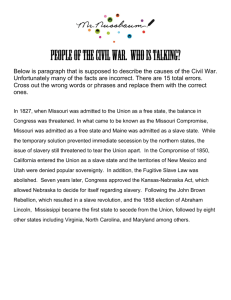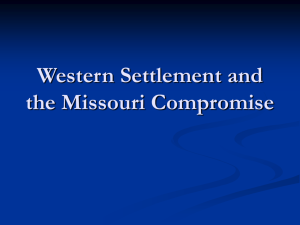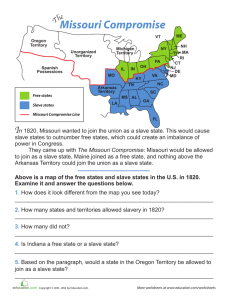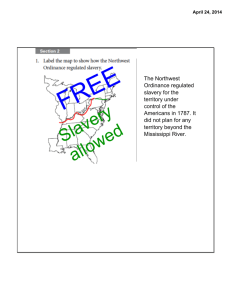Slave State - Montgomery County Schools
advertisement
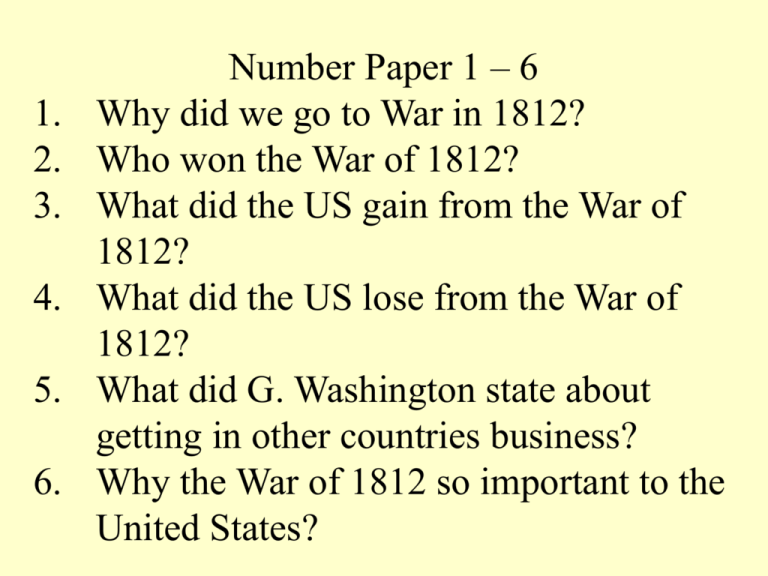
1.
2.
3.
4.
5.
6.
Number Paper 1 – 6
Why did we go to War in 1812?
Who won the War of 1812?
What did the US gain from the War of
1812?
What did the US lose from the War of
1812?
What did G. Washington state about
getting in other countries business?
Why the War of 1812 so important to the
United States?
Number Paper 1 – 6
1. Why did we go to War in 1812?
Impressments - sovereignty
2. Who won the War of 1812?
No One
3. What did the US gain from the War of
1812?
Nothing but a Large War Debt
Number Paper 1 – 6
4. What did the US lose from the War of
1812? Men/Washington DC
5. What did G. Washington state about
getting in other countries business?
Stay Out!!!
6. Why the War of 1812 so important to the
United States?
Show the world it could stand up to other
countries and can not be defeated –
maintain its sovereignty
President James Monroe
A. Elected in 1816
(Democratic-Republican)
B. Two Terms: 1816-1824
C. “Era of Good Feelings”
D. Monroe Doctrine
E. Missouri Compromise
F. Basic Information
a. Term: 5th President of the United States
b. Born: Westmoreland County, Virginia (April
28, 1758)
c. Education: College of William and Mary
(graduated 1776)
d. Career: Lawyer
e. Political Party: Democratic-Republican
f. Life in Brief:
i.
James Monroe was the last
American President of the “Virginia
Dynasty”
ii. soldier,
iii. diplomat,
iv. governor,
v. senator, and
vi. cabinet official
U.S Struggle with Other Nations
A. Britain
a. US & Britain wanted to keep naval &
fishing rights on the Great Lakes
b. Rush-Bagot Agreement – US & Britain
agreed to limit naval power on the Great
Lakes
c. Convention of 1818
i. Set the border between US & Canada at
49° N latitude as far west as Rocky
Mountains
ii. Occupy the Pacific Northwest together
iii. Gave U.S. fishing rights off
Newfoundland & Labrador coasts
B. Spain
a. Dispute over border
between US and
Spanish Florida
i. US sent troops to
secure the southern
border
ii. General Andrew
Jackson was the
commander
b. Conflicts occurred between US and
Florida’s Seminole Indians
i. Seminole’s helped runaway slaves
ii. Seminole’s raided U.S. settlements
iii. Response – capture Seminole raiding
parties
c. General Jackson conquest of Florida
without Monroe’s permission
i. Took over most of Spain’s military post
ii. Overthrew governor of Florida
iii. American people supported Jackson
actions
d. Adam-Onis Treaty (1819)
a. Spain gave East Florida to US
b. US gave up claims to Texas
c. US agreed to pay up to $5 million of US
citizens’ claims against Spain
Adams-Onis Boundaries
1.
2.
3.
4.
5.
6.
Number Paper 1 – 10
List the four presidents from Virginia.
“
“
“
“
“
“
Which army general acted against Spain
without presidential instructions?
Which president was the last of the
“Virginia Dynasty”?
7.
Which political party was James Monroe a
member?
8. Why was southern planters upset with the
Seminole Indians?
9. What did General Andrew Jackson do that
could have started a war with Spain?
10. What was the solution to the struggle over the
Pacific Northwest?
1.
2.
3.
4.
5.
Number Paper 1 – 10
List the four presidents from Virginia.
Washington
“
“ Jefferson
“
“ Madison
“
“ Monroe
Which army general acted against Spain
without presidential instructions?
Andrew Jackson
6. Which president was the last of the
“Virginia Dynasty”?
Monroe
7.
Which political party was James Monroe a
member?
Democratic-Republican
8.
Why was southern planters upset with the
Seminole Indians?
Raids or Hiding Runaway Slaves
9. What did General Andrew Jackson do that
could have started a war with Spain?
Captured Army Post or Overthrow Governor
10. What was the solution to the struggle over the
Pacific Northwest?
Shared Responsibility For The Area
The Monroe Doctrine
A. 1823 (Sec. Of
State - John
Quincy Adams)
B. No more European
colonization in
Western
Hemisphere
C. US dominance of
Western
Hemisphere
established
Monroe Doctrine
The occasion has been judged proper for asserting… that the
American Continents.. Are henceforth not to be considered as subjects
for future colonization by any European powers…
The political system of the allied powers is essentially different …
from that of America. We … declare that we should consider any
attempt on their part to extend their system to any portion of this
hemisphere as dangerous to our peace and safety…
With the existing colonies… we have interfered and shall not interfere.
But with the governments who have declared their independence and
maintained it, and whose independence we have … acknowledged, we
could not view any interposition (interference) for the purpose of
oppressing them … by any European power in any other light than has
the manifestation (evidence) of an unfriendly disposition (attitude)
toward the United States.
D. Four Basic Points:
a. US would not interfere with affairs
of European nations (outside Western
Hemisphere)
b. US would not interfere with existing
European colonies in the Americas
c. Western Hemisphere off limits to
future colonization by foreign
powers (European)
d. Any European action in Western
Hemisphere would be considered a
hostile act (Act of War)
Implications in the Western Hemisphere
A. US dominance until
the present
B. US role in Latin
American affairs
C. European direct
influence limited
D. Precedent of
Isolationism with
Europe
Panic of 1819
A. First major US Financial Crisis
B. Banks throughout the country failed
C. Mortgages were foreclosed
a. forcing people out of their homes
b. & off their farms.
c. Thousands put in debtors prison
D. Falling prices impaired agriculture and
manufacturing, triggering widespread
unemployment.
E. Result: Law passed for relief project &
ending of debtors prison
Missouri Compromise
A. Issue: Slavery in the new states
a. Will a new state be a FREE or SLAVE
State
i. Free State – No Slavery Allowed at
all
ii. Slave State – Slavery Permitted
everywhere
A. Which region, North or South, had the most square miles of
land? {Add the square mile from the north and the south.
Compare the two. (Show the work on the data sheet)}
South = 504,654; North = 294,091; South Largest
B. Which region, North or South, was the more densely
populated? {Add the density of each region and then divide
by 11. Compare the two. (Show the work on the data sheet)}
North = 30.96; South = 13.5; North = greatest density
B. Which of the original 3 colonial regions have the largest
square mile area? (Show your work)
NE = 22,959 M = 101,963 S = 212,153
D. Which of the original 3 colonial regions have the highest
density of people per square mile? (Show your work) _
NE = 56.75; M = 31.52; S = 18.6
E. Which region, North or South, had the higher population of black
people? {Add the square mile from the north and the south.
Compare the two.
North = 118,000 South = 1,563,000
F. In what two southern states did the black population outnumber the
white population?
Louisiana
South Carolina
G. In which region can you find states where the female population
outnumbered the male population? Name the states.
(North) NH = 124,000/120,000; MA = 268,000/255,000
H. Compare the land area in the territories where slavery was
prohibited with that of the territories where slavery was permitted.
{Add the land area of Florida territory & Arkansas territory and
compare it with the Michigan territory}. Which has the greatest
land area? Free or Slave
Slave = 160,136 Free = 186,052
What difference does it make?
More of America remaining free
I. What changes did the Missouri Compromise bring to the U.S.
Map?
Kept the US from having a Civil War North vs South
J. How did the Missouri Compromise solve the problem of
keeping the balance of power in the Senate between free and
slave states?
Kept the Senate equal from Free to Slave 11/11 to 12/12
K. What territory was to be kept free of slavery?
Unorganized Territory; Most of the Louisiana territory
L. Why would the South begin to look to the land to the west of
the borders of the U.S., in what was then part of Mexico?
If the South could expand westward, it could add slave states
within the context of the Missouri Compromise
M. Could either side be considered the winner in this
compromise? NO
WHY?
WHY NOT?
The power stay the same and the institution of slavery
remained just as powerful
N. What were the inhabitants of the portion of the Missouri Territory
that was petition (asking) for statehood authorized to do?
[Introduction]
Be it enacted by the Senate and House of Representatives of the
United States of America, in Congress assembled, That the
inhabitants of that portion of the Missouri territory included
within the boundaries herein after designated, be, and they are
hereby, authorized to form for themselves a constitution and
state government, and to assume such name as they shall deem
proper; and the said state, when formed, shall be admitted into
the Union, upon an equal footing with the original states, in all
respects whatsoever.
O. What were the two qualifications to vote and hold office in
the Missouri Territory? [Section 3]
SEC. 3. And be it further enacted, That all free white male
citizens of the United States, who shall have arrived at the
age of twenty-one years, and have resided in said territory:
three months previous to the day of election, and all other
persons qualified to vote for representatives to the general
assembly of the said territory, shall be qualified to be elected
and they are hereby qualified and authorized to vote, and
choose representatives to form a convention, who shall be
apportioned amongst the several counties as follows :
From the county of Howard, five representatives.
P. What form of government were they required to establish?
[Section 4]
Section 4; …Provided, That the same, whenever formed,
shall be republican, and not repugnant to the
constitution of the United States; and that the legislature
of said state shall never interfere with the primary
disposal of the soil by the United States, nor with any
regulations Congress may find necessary for securing
the title in such soil to the bona fide purchasers ; and that
no tax shall be imposed on lands the property of the
United States ; and in no case shall non-resident
proprietors be taxed higher than residents.
Q. How many representatives would they be given in the House of
Representatives until the next census could be taken? [Section
5]
SEC. 5. And be it further enacted, That until the next general
census shall be taken, the said state shall be entitled to one
representative in the House of Representatives of the United
States.
R. What year will the next census be taken? [Your knowledge]
Every ten years 1820 + 10 = 1830
S. What section of a town must be used for a school? [Section
6.1]
SEC. 6. And be it further enacted, That the following
propositions be, and the same are hereby, offered to the
convention of the said territory of Missouri, when formed, for
their free acceptance or rejection, which, if accepted by the
convention, shall be obligatory upon the United States:
First. That section numbered sixteen in every township, and
when such section has been sold, or otherwise disposed of, other
lands equivalent thereto, and as contiguous as may be, shall be
granted to the state for the use of the inhabitants of such
township, for the use of schools.
T. What percentage of state taxes must be reserved for the
building of roads and canals? [Section 6.3]
SEC. 6. And be it further enacted, That the following propositions
be, and the same are hereby, offered to the convention of the said
territory of Missouri, when formed, for their free acceptance or
rejection, which, if accepted by the convention, shall be
obligatory upon the United States:
Third. That five per cent. of the net proceeds of the sale of lands
lying within the said territory or state, and which shall be sold by
Congress, from and after the first day of January next, after
deducting all expenses incident to the same, shall be reserved for
making public roads and canals, of which three fifths shall be
applied to those objects within the state, under the direction of the
legislature thereof; and the other two fifths in defraying, under
the direction of Congress, the expenses to be incurred in making
of a road or roads, canal or canals, leading to the said state.
U. What must the Missouri territory present to Congress in order
to become a state? [Section 7]
SEC. 7. And be it further enacted, That in case a constitution and
state government shall be formed for the people of the said territory
of Missouri, the said convention or representatives, as soon
thereafter as may be, shall cause a true and attested copy of such
constitution or frame of state government, as shall be formed or
provided, to be transmitted to Congress.
V. Where was slavery “forever prohibited”? [Section 8]
Section 8. And be it further enacted. That in all that territory
ceded by France to the United States, under the name of
Louisiana, which lies north of thirty-six degrees and thirty
minutes north latitude, not included within the limits of the state,
contemplated by this act, slavery and involuntary servitude,
otherwise than in the punishment of crimes, whereof the parties
shall have been duly convicted, shall be, and is hereby, forever
prohibited: Provided always, That any person escaping into the
same, from whom labour or service is lawfully claimed, in any
state or territory of the United States, such fugitive may be
lawfully reclaimed and conveyed to the person claiming his or her
labour or service as aforesaid.
W. What was the provision for fugitive slaves? [Section 8]
Section 8. And be it further enacted. That in all that territory ceded
by France to the United States, under the name of Louisiana,
which lies north of thirty-six degrees and thirty minutes north
latitude, not included within the limits of the state, contemplated
by this act, slavery and involuntary servitude, otherwise than in the
punishment of crimes, whereof the parties shall have been duly
convicted, shall be, and is hereby, forever prohibited: Provided
always, That any person escaping into the same, from whom
labour or service is lawfully claimed, in any state or territory
of the United States, such fugitive may be lawfully reclaimed
and conveyed to the person claiming his or her labour or
service as aforesaid.
b. 1819 – 11 Free States/11 Slave State
i. Settlers in the Missouri Territory
asked to join the Union as a slave
state.
ii. Slave states would outnumber free
states.
iii. Power in congress would shift from a
tie to pro slave state
iv. Result – possible dissolution of the
Union
• Who would settle the issue?
• Henry Clay
• Born in Virginia
• Father was a Baptist
minister
• No formal schooling –
self taught
• Studied law
• Congressman from
Kentucky for 42 years
• Ran for President five
times
• Slave owner
• Henry Clay
• Aim to keep Union together
• Argued in Congress for months
• Persuaded Congress to agree to a
compromise to keep Union together
Quick Quiz
The purpose of the Missouri compromise was to
a. Return slaves captured in free states to slave
states
b. Allow slavery in Maine but not in Missouri
c. Maintain a balance of free and slave states
d. Let Missouri have slavery until 1850
Andrew Jackson
A. Background
a. Born in 1767 in Waxhaw,
South Carolina, self-made
lawyer, legislator and slave
owner
b. National hero at the Battle of
New Orleans
c. Removed Creek Indians from
Tennessee, fought against
Seminole Indians in Florida
d. 7th President, 1828-1837
B. Inauguration
a. Victory for the common man
b. Huge party on White House lawn which
almost got out of hand
c. Set up “Spoils System”
a. changing government workers was a
good thing
b. rewards political supporters with
government jobs
c. belief that ordinary citizens can do
government jobs
d. Set Up Kitchen Cabinet – informal group
of trusted advisers who met in White
House kitchen.
C. Issue 1: Three Regions
a. North
i. Economy based on trade &
manufacturing
ii. Supported tariffs to keep
competition out (British)
iii. Opposed governments selling of
cheap public land resulted in less
workers
iv. Opposed slave labor
b.
South
i.
Economy based on large & small
farming
ii. Main cash crops – cotton & tobacco
iii. Sold large amounts of products to
foreign countries
iv. Imported manufacturing goods
v. Opposed high tariffs
a) Higher prices for imported goods
b) Trading partners raise tariffs on
American goods
vi. Depended on slave labor
c. West
i. Developing small farm economy
ii. Supported policies that helped small farms
& encouraged further settlement
a) Selling of land cheaply
b) Building and maintaining roads
c) Building and maintaining water
transportation such as canals
D. Issue 2: State’s Rights
a. Nullification Crisis
i. Congress passed high tariff on
imports helping North industries
ii. Tariff hurt South planters –
nicknamed it “Tariff of
Abomination” (hateful thing)
iii. Response – “SC Exposition &
Protest” stated that no state or
region could be favored over
another
b.
Hayne – Webster
i.
Hayne (SC) stated that nullification was a
way to protest federal laws
ii. Webster (MA) stated one nation under one
law not a pact of independent nations
iii. Result a) SC threatened to leave the union
b) Jackson threatened to use the army to
enforce law in SC
c) No other southern state joined
d) 1833 Compromise lower tariff
e) SC enforced the law
f)
States Rights continue to be an issue
E. Issue 3: Native Americans –
Racism/Removal
a. Americans had a history of violating
treaties and forcibly removing Indians
from their land
b. 2 views of dealing with Indians either:
i. forcibly remove them and relocate
them to lands west of the Mississippi
ii. A growing number of Americans view
Indians as an inferior who blocked
progress
John Ross
Son of a Scotsman and
Cherokee mother, who
adopted American way of
life
Wanted to prove loyalty
during War of 1812 and
was veteran who served
under Jackson
Strongly fought against the
taking of Cherokee lands
by using the American
legal and diplomacy
Major Ridge
Veteran of War of
1812, fought against
the British and
becomes a major
He feels that some of
Cherokee Georgia land
must be sold to
Georgia to prevent the
suffering of his people
Fought against racism
and discrimination
toward Cherokee
through legal system
Removal From Georgia
Georgia is desired because it
posses fertile soil and it the
next area of expansion
Gold is discovered in 1828 in
Georgia over 10,000 Anglos
rush to Georgia
Land lotteries of Cherokee
land take place even though
Cherokees live there
Cherokees have legal
proof that Georgia
has recognized them
an independent nation
Georgia will pass
laws that state
Cherokee land is
actually Georgia’s
land
Jackson will send
Federal troops who
will be used to subdue
some of the tribes
The Trail of Tears
c. The Indian Removal Act, 1830
i. Indian Removal Act, offered Native
Americans new lands west of
Mississippi in return for their land in
the southeastern states
ii. Some Cherokees accept the offer and
sell their land while other Cherokee
tribes refuse
iii. Americans view Native Americans as
blocking advancement of civilization
Challenge: Worchester v. Georgia, 1832
The Supreme Court under John Marshall
ruled that Georgia could not remove the
Cherokee from their land because they were
a recognized nation with their own
recognized boundaries
Jackson does not follow the Supreme Court
ruling and sides with the state of Georgia, he
is strongly supported by the planter elite
15,000 Indians will be forced from their
homes, 4,000 will die because of the move
iv. The Trail of Tears
a) The Cherokee were removed
from the Southeastern states to
territory in Oklahoma in 1838
b) U.S. Army forcibly removed
them from their homes just
before winter.
c) The Cherokee believed that
their legal victory would
protect them from being
removed from their land.
d) Thousands will die due to not
being prepared for trip
e) Trail is 1,200 miles long
traveled by foot
The Trail of Tears
